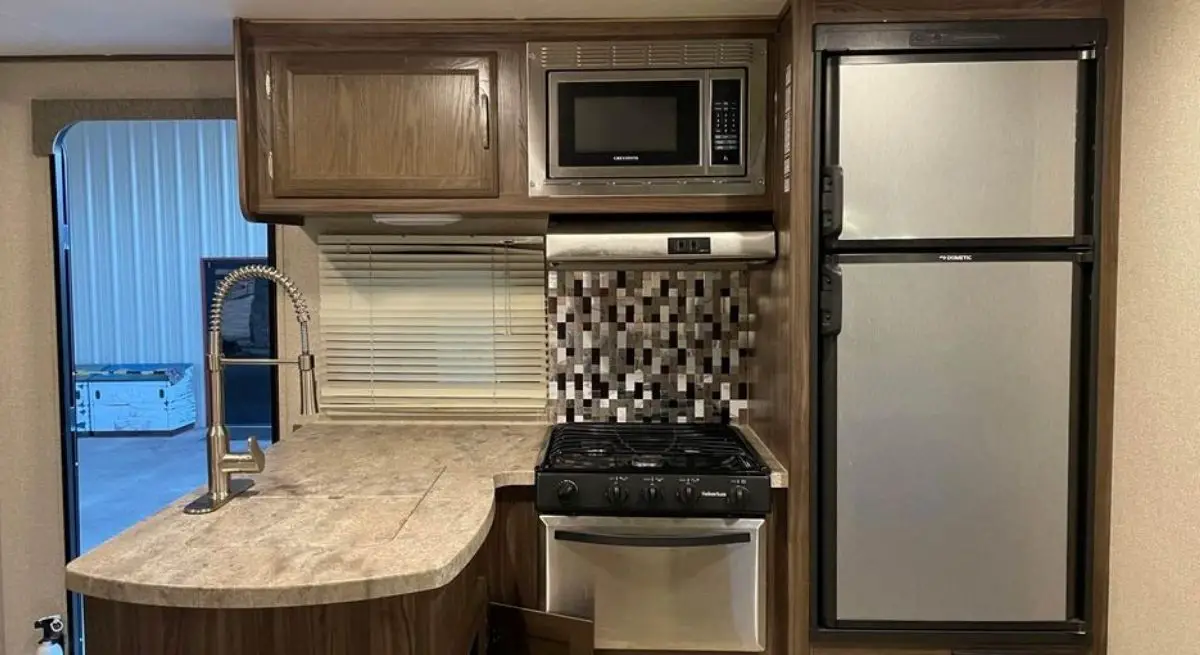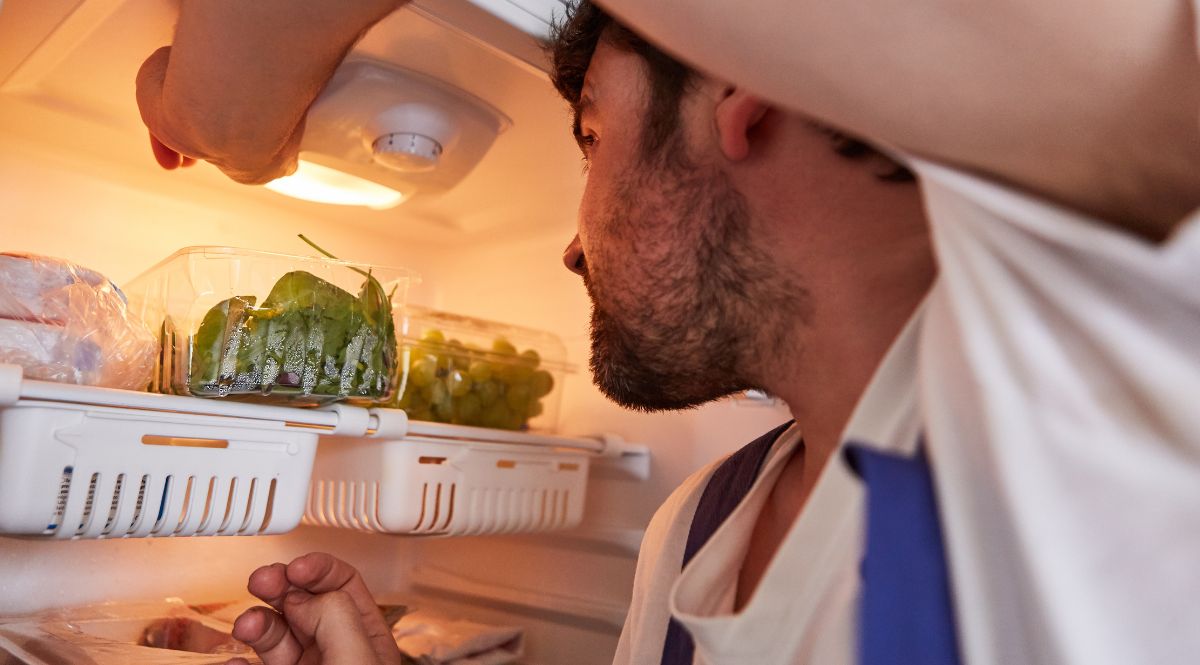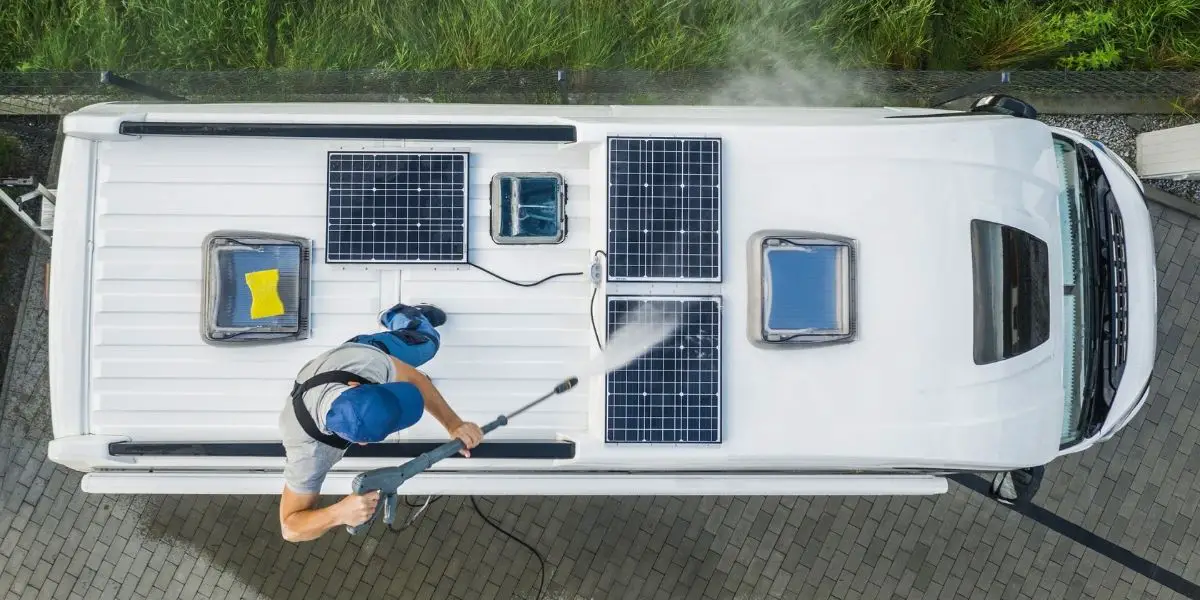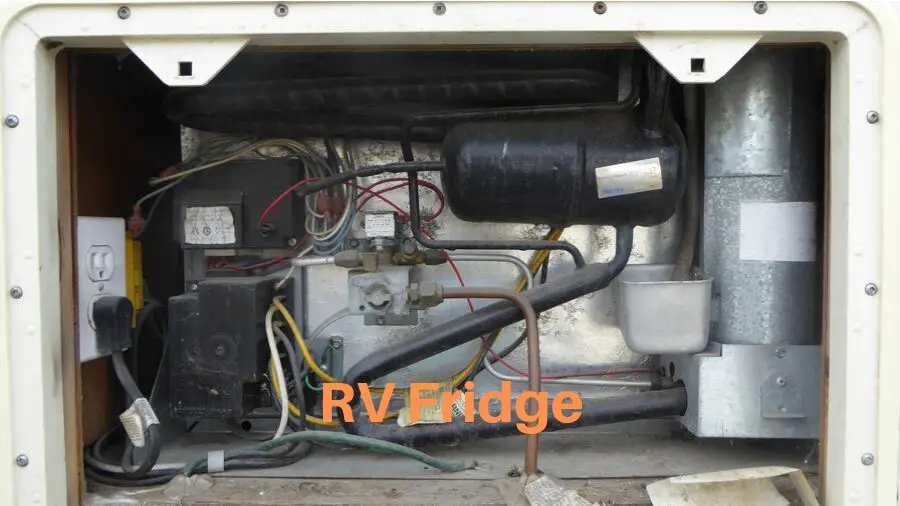The refrigerator is one of the most important appliances in your RV because we rely on it to keep our food safe while we travel. A refrigerator failure, while you are on the road, can quickly ruin a trip and leave you stuck with some hefty repair bills. Learning the sounds your refrigerator makes during normal operation can help you detect problems before they become a catastrophe.
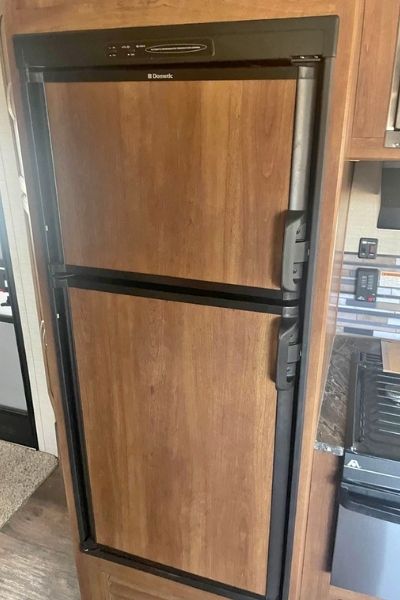
Those sounds will depend on the type of refrigerator your RV has. Most RVs will have an auto-sensing dual mode RV refrigerator which is capable of automatically switching operation between 120V shore power and propane. These units make some unique sounds that you shouldn’t hear coming from a 120V residential style refrigerator, or a 12V DC-only unit.
The latter two types of refrigerators are also found in modern RVs, but to a lesser extent. It is important to know which kind you have both for day-to-day operations as well as for when you need to service them down the road. If you are not familiar with how RV fridges work you can read about them in this article on the subject, or perhaps you are not sure what kind of fridge is in your RV you can read more about it here. Some RV fridges need to be level to work, while some do not. If you are having problems with your RV fridge and need to troubleshoot your situation, try this article that will help you along to solve your problem.
Most of the sounds we’ll be covering here pertain to the common dual-mode refrigerators. If the sounds are common or unique to 120V only or 12V DC only refrigerators, then we’ll note that as well. Let’s take a look at some of these sounds and what they may mean to the health and operation of your refrigerator.
Why Does My Fridge Make A Clicking Noise?
When switching from electric to propane, a dual-mode refrigerator will ignite a propane flame to keep your refrigerator cool. The clicking noise you hear is the automatic igniter arcing to light that flame. It should click up to 3 times or so, followed by a faint burner/flame sound. Sounds that indicate a problem with the propane switchover from electric are:

- No clicking – This indicates a problem with the igniter.
- Continued clicking with no ignition sound – this indicates a propane issue
- Click, ignition sound, flame cuts off – this indicates an issue with the flame sensor.
Any other clicking sound in a refrigerator is generally bad. Some residential units may have audible relays which turn on the compressor, but most are insulated well enough that you can’t hear them. If you can hear them, learn that sound as part of the normal operation.
Another clicking may indicate electrical arcing of some kind. If you hear clicking that you’re not familiar with, try and locate the source. If it’s a relay, then you should be ok. If it’s not or if you can visibly see arcing or signs of arcing (burned areas) then shut the refrigerator off immediately and service it.
One final source for a clicking sound can be the movement of coolant through the cooling system. While this usually makes more of a gurgling sound it can also sound more like a click. If the refrigerator is having trouble staying cool, you’re hearing clicking sounds in the cooling system and you’re sure it’s not a failure to ignite on propane then consider burping your refrigerator. This may clear any blocking bubbles and allow the refrigerator to cool normally.
Why Does My Fridge Make A Gurgling Noise?
A gurgling noise coming from your refrigerator is usually caused by the normal process of the coolant in the cooling lines boiling and condensing as it cools the refrigerator. This is completely normal and not anything to worry about.
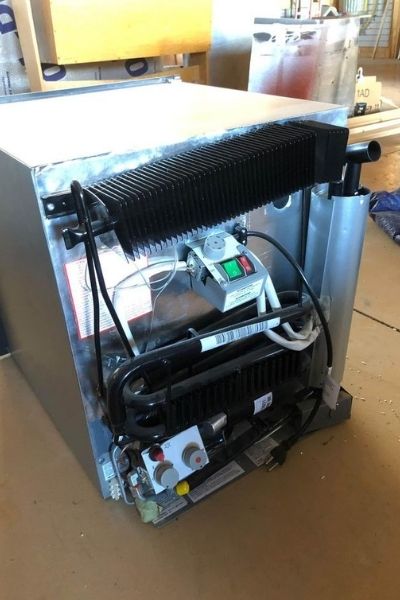
If your refrigerator is making a gurgling sound and not cooling your food down then you may have air bubbles trapped in the cooling lines. Those bubbles prevent to coolant from properly flowing through your refrigerator to cool it down. If you have this situation in your unit you have two options.
The expensive, but most reliable route is to simply replace the cooling system. This will usually require specialized equipment so it’s not considered a DIY project. The quicker, easier, and much cheaper option of burping your refrigerator is usually worth a try. It may not solve the issue entirely, or at all, but it offers a possible solution that can be done before diving into a full replacement.
Other sources of gurgling noises can be from water hitting the defroster in frost-free models, or water running down drain hoses and out the RV. The former is normal and nothing to worry about either. The latter may be of concern for a couple of reasons.
Excess water draining out can indicate that your refrigerator is no longer cooling. It’s also important to confirm that any drain tubes are draining to a safe location. if they are draining on the floor or into the RV structure then expensive water damage can occur quickly.
How Do You Burp An RV Refrigerator?
“Burping” your refrigerator involves flipping it upside down to force the coolant to flow through the plumbing and remove any bubbles along the way. Optimal refrigerator performance can only be achieved when the coolant in the refrigerator can flow freely through the internal refrigerator cooling system.
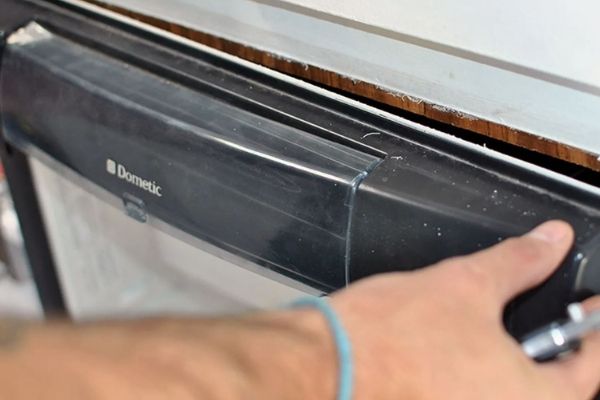
This requires that the refrigerator be kept in a level environment. As we all know, it is nearly impossible to travel and keep your RV refrigerator level at all times. In fact, traveling puts all kinds of stress on the coolant flowing through your refrigerator. This can cause bubbles to form in the cooling system which can then lead to poor or inconsistent cooling.
To get those bubbles out, you’ll need to “burp” your refrigerator. To do that, you’ll need to remove the refrigerator from the RV. Doing so will require you to disconnect the electrical and gas connections and then reconnect them when you’re done. If you’re not comfortable doing that then have a professional remove and reinstall the unit for you.
Once you have the refrigerator out, stand it up in its normal position. Then slowly lay it on its side. Continue rolling it in the same direction slowly until it’s upside down and resting on its top. Let it rest there for at least 15 minutes. Then slowly roll it back on its side and then back into the upright position. Let it rest there for at least 15 minutes before reinstalling back into the RV. While putting it back in, be careful to keep it as upright and level as possible.
Is A Noisy Fridge Dangerous?
RV refrigerators do make some noises during normal operations, but those noises should not be excessive or overly loud. An excessively noisy refrigerator is not necessarily dangerous, but it could indicate a potentially dangerous problem.
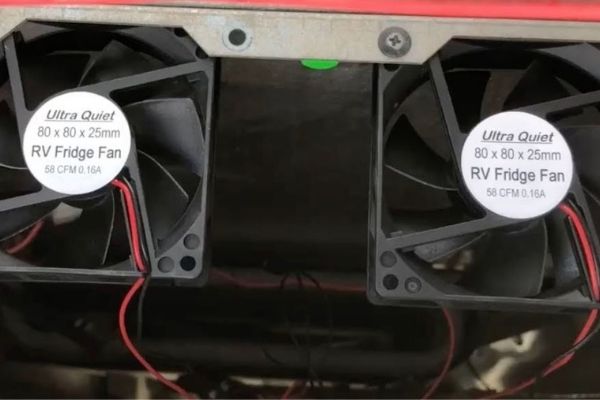
Common sounds include light clicking when switching from electric to propane, the sound of a small propane flame burning, gentle fan noises, gurgling, and some dripping sounds. These are typical and usually OK to hear. Excessive or loud clicking or dripping, loud humming, excessive fan noises, or any other loud or offensive noises should be checked out by a qualified service person.
Why Does My RV Fridge Make A Humming Noise?
The most common cause of a humming noise in an RV refrigerator is an automatic cooling fan. RV refrigerators can be cooled in one of two ways, either through a chimney or through a forced-air vent. Chimney-cooled refrigerators usually do not have a cooling fan.
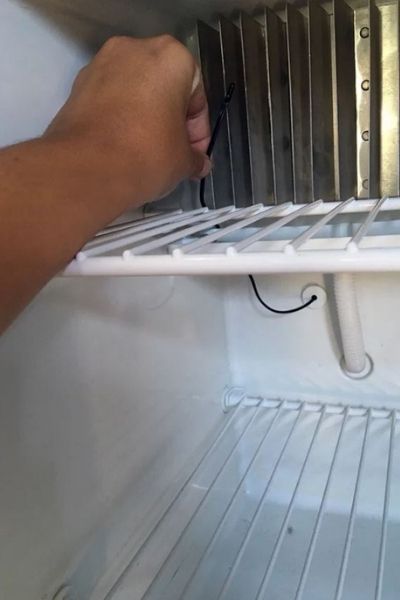
If your refrigerator is installed in a slideout, a corner location, or anywhere that a chimney cannot be used then it is likely vented through a high wall vent with the assistance of a thermostatically controlled fan. When these fans fail, they make a humming noise. When you can hear the noise, see if you can trace it to the fan. IF you can, you may need to replace that fan before it fails completely.
Why Is There A Humming Noise Coming From My RV Fridge On Electric Only?
When operating in electric mode, the electric motor compressor will run to cool down your refrigerator. A humming on electric power suggests that there may be an issue with the compressor.
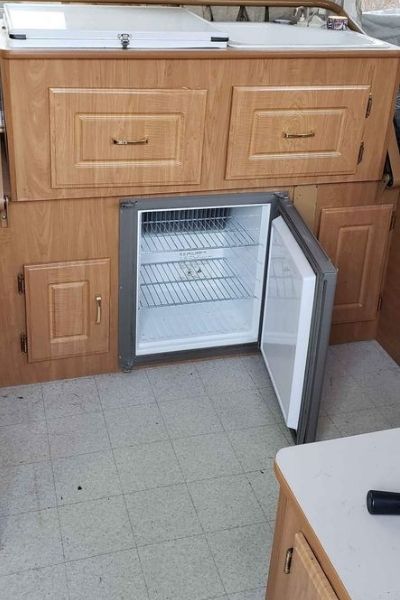
Diving into a compressor repair or replacement is usually best left to the professionals, but you may be able to get in there and clean around the compressor area to see if you can get it to quiet down. Dirt and debris can collect around the compressor and make it noisy.
The compressor can also run louder than usual if the refrigerator is not properly leveled. If you are experiencing humming in your refrigerator and your RV is not level, try properly leveling your rig and see if that helps.
Why Is There This Dripping Noise From My RV Fridge?
Most RV refrigerators are not frost-free. They cool the food storage compartments with aluminum finned heat sinks that are exposed to the air in the food compartment. Natural convection over the cold surface of the heat exchanger circulates the air in the chamber to keep it cold.
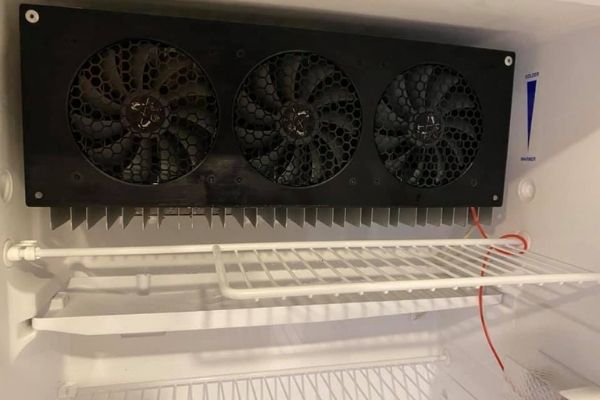
When you open and close the refrigerator door you let warm moist air in. That can cause two things to happen. Initially, the warmer air can allow any frozen moisture on the heat exchanger to melt. That water will drop down, usually into a catch pan right under the heat exchanger.
As things cool back down, the warm moist air will condense. Some of that moisture will freeze back on the heat exchanger. It can also condense on the inside walls of the fridge or the cold contents on the shelves. This can lead to dripping sounds in a number of ways.
- You can get water dripping from the heat exchanger into the drip catch pan. This is normal and you should make it a habit to remove and empty that drip pan routinely.
- The drip catch pan is far enough away from the heat exchanger that it should not freeze, although it’s not uncommon for freezing to occur. If it freezes over then water dripping from the heat exchanger will quickly overflow the catch pan and drip on the floor of the refrigerator. If the drip pan does not freeze and you don’t empty it then overflow dripping can still be a problem. If you hear dripping and/or notice a damp or wet floor in front of your refrigerator, check this pan to make sure it’s working correctly.
A dripping sound can also indicate that your refrigerator is not cooling at all. When your refrigerator fails to cool, the heat exchanger will warm up. Any ice built up on the heat exchanger will thaw and drip as described above. The freezer and refrigerator usually operate on the same cooling circuit so the freezer will also thaw. Water from areas can drip down to lower parts of the refrigerator.
Most refrigerators have a drain tube to channel excess water outside without damaging the interior structure of your RV. Make sure this drain tube is clear and positioned to allow excess water to escape properly. If it’s dripping on the floor of the RV then water damage will follow quickly. The tube should run outside so the water drips on the ground.

